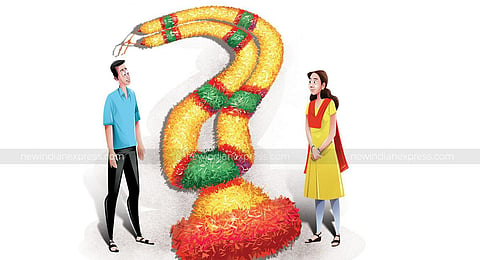

KOCHI: The Kerala High Court has observed that nowadays the younger generation thinks that marriage is an evil that can be avoided to enjoy a life without any liabilities or obligations.
"They would expand the word 'WIFE' as 'Worry Invited For Ever' substituting the old concept of 'Wise Investment For Ever'. The consumer culture of 'use and throw' seems to have influenced our matrimonial relationships also. Live-in-relationships are on the rise, just to say goodbye when they fall apart," observed a division bench comprising Justice A Muhamed Mustaque and Justice Sophy Thomas.
The court issued the order while dismissing the appeal filed by a 34-year-old man from Alappuzha challenging the rejection of his divorce petition by the family court. He sought to dissolve the marriage with his wife on the grounds of cruelty. According to him, their marital relationship was irretrievably broken and so he wanted a divorce.
His wife had developed some behavioural abnormalities and picked up quarrels with him alleging he had illicit relationships with other women, he said. The Court said that when the wife had reasonable grounds to suspect the chastity or fidelity of her husband, and if she questions him or expresses her deep pain and sorrow before him, it cannot be termed as a behavioural abnormality, as this is the natural human conduct of a normal wife.
The Court observed that Kerala, known as God’s own country, was once famous for its well-knit families. But the present trend seems to be to break the nuptial tie for flimsy or selfish reasons, or extra-marital relationships, unmindful even of their children.
The wails and screams coming out of disturbed and destroyed families are liable to shake the conscience of society as a whole. When the numbers of warring couples, deserted children, and desperate divorcees go up, it will no doubt adversely affect the tranquillity of our social life, and our society will have stunted growth, the judges observed.
The law and religion both consider marriage as an institution by itself and parties to the marriage are not permitted to walk away from that relationship unilaterally, unless and until they satisfy the legal requirements to dissolve their marriage through a court of law or by the personal law which governs them, they went on to add.
Mere quarrels, ordinary wear and tear of matrimonial relationships, or casual outbursts of some emotional feelings cannot be treated as cruelties warranting a divorce. From the facts of this case, it is obvious that the unholy alliance of the husband with some other lady has caused some disturbances in the family life, which was otherwise smooth, said the Court.
The normal human reactions or responses from a wife, mother to their girls, on knowing that her husband was having an illicit relationship with another lady, cannot be termed behavioural abnormality or cruelty on the part of the wife, and be the grounds to dissolve their marriage. The close relatives of the husband had all admitted that the wife is a good-natured lady, who loves her husband and family, the Court observed.
"From time immemorial, marriage was considered solemn, and sanctity attached to the relationship of a man and wife united in marriage was considered inseparable, and it was the very foundation of a strong society. Marriage is a socially or ritually recognized union, or legal contract between spouses, that establishes rights and obligations between them, between them and their children, and between them and their in-laws. Family is the basic unit of society, from where we learn virtues, values, skills, and behavior. Marriage is not a mere ritual or an empty ceremony for licensing the sexual urge of the parties," the Court stated.